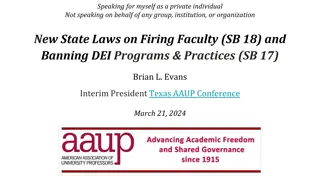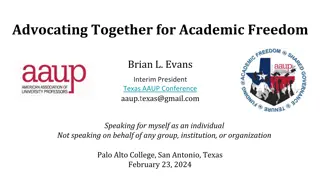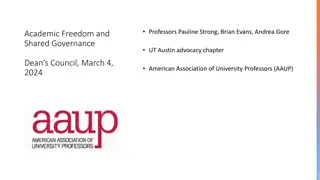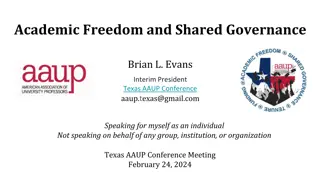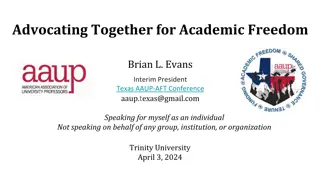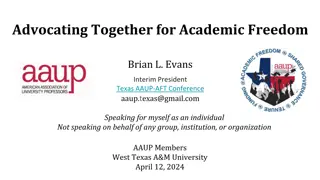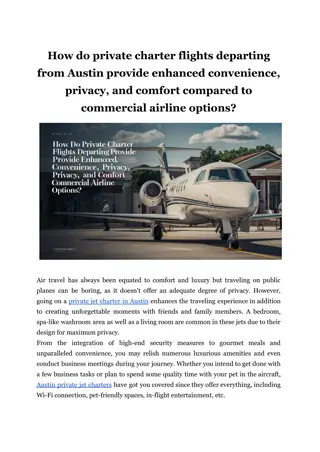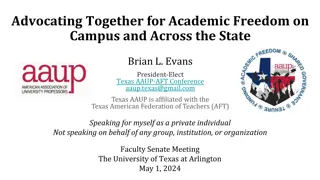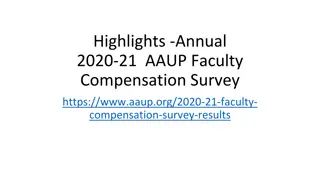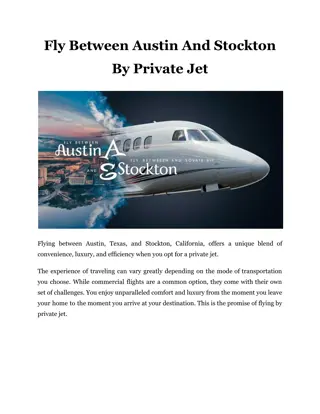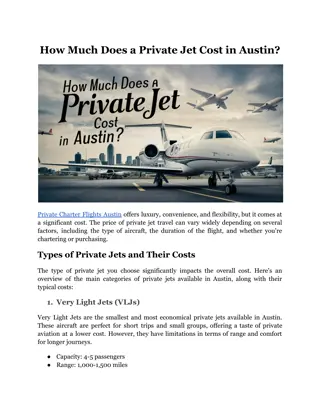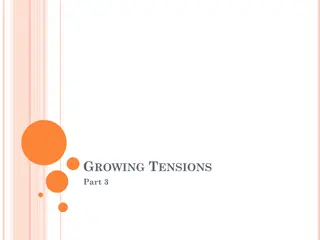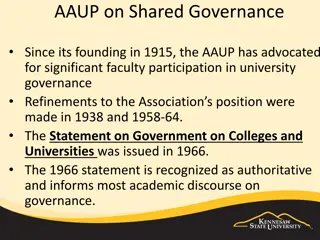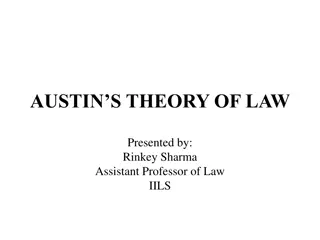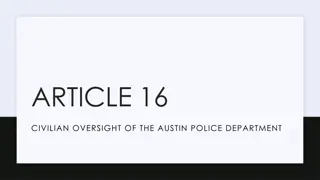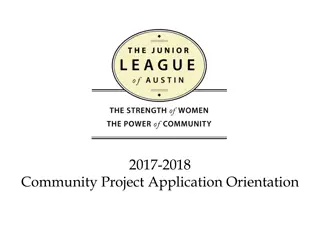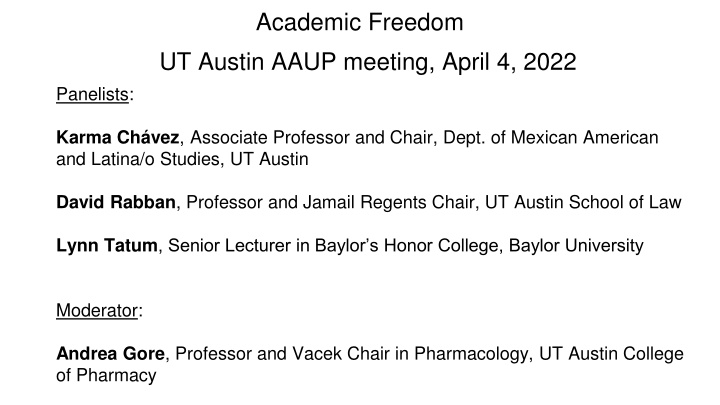
Academic Freedom: Evolution and Principles in Higher Education
Explore the historical timeline and foundational principles of academic freedom, as outlined by the AAUP. Delve into key declarations and statements, such as the 1940 Statement of Principles, emphasizing freedom in research, publication, and classroom discussion. Discover the significance of academic freedom for college and university teachers as members of both academia and society.
Download Presentation

Please find below an Image/Link to download the presentation.
The content on the website is provided AS IS for your information and personal use only. It may not be sold, licensed, or shared on other websites without obtaining consent from the author. If you encounter any issues during the download, it is possible that the publisher has removed the file from their server.
You are allowed to download the files provided on this website for personal or commercial use, subject to the condition that they are used lawfully. All files are the property of their respective owners.
The content on the website is provided AS IS for your information and personal use only. It may not be sold, licensed, or shared on other websites without obtaining consent from the author.
E N D
Presentation Transcript
Academic Freedom UT Austin AAUP meeting, April 4, 2022 Panelists: Karma Ch vez, Associate Professor and Chair, Dept. of Mexican American and Latina/o Studies, UT Austin David Rabban, Professor and Jamail Regents Chair, UT Austin School of Law Lynn Tatum, Senior Lecturer in Baylor s Honor College, Baylor University Moderator: Andrea Gore, Professor and Vacek Chair in Pharmacology, UT Austin College of Pharmacy
Academic Freedom Timeline 1915 Declaration of Principles on Academic Freedom and Tenure Committee on Academic Freedom and Academic Tenure of the American Association of University Professors (AAUP) 1925 Conference Statement on Academic Freedom and Tenure Joint Statement by the Association of American Colleges and AAUP 1940 Statement of Principles on Academic Freedom and Tenure AAUP and Association of American Colleges (now the AAC&U) Baylor University, UT Austin, UW-Madison and 900+ others are AAC&U members Endorsed by more than 250 scholarly and educational organizations (MLA, American Historical Association, Association of American Law Schools, Mathematical Association of America, American Association of Colleges of Pharmacy ). https://www.aaup.org/endorsers-1940- statement 1970 Interpretive Comments to the 1940 Statement Jointly formulated and adopted by AAUP and AAC&U [1] https://www.aaup.org/NR/rdonlyres/A6520A9D-0A9A-47B3-B550-C006B5B224E7/0/1915Declaration.pdf [2] https://www.aaup.org/report/1940-statement-principles-academic-freedom-and-tenure
AAUP 1940 Statement of Principles on Academic Freedom and Tenure AAUP and Association of American Colleges (now the AAC&U) Endorsed by more than 250 scholarly and educational organizations* 1. Teachers** are entitled to full freedom in research and in the publication of the results, subject to the adequate performance of their other academic duties . **includes an investigator who is attached to an academic institution without teaching duties.
2. Teachers are entitled to freedom in the classroom in discussing their subject, but they should be careful not to introduce into their teaching controversial matter which has no relation to their subject.* *The intent of this statement is not to discourage what is controversial. Controversy is at the heart of the free academic inquiry which the entire statement is designed to foster. From the 1970 Interpretive Comments to the 1940 Statement
3. College and university teachers are citizens, members of a learned profession, and officers of an educational institution. When they speak or write as citizens, they should be free from institutional censorship or discipline, but their special position in the community imposes special obligations.
As scholars and educational officers, they should remember that the public may judge their profession and their institution by their utterances. Hence they should at all times be accurate, should exercise appropriate restraint, should show respect for the opinions of others, and should make every effort to indicate that they are not speaking for the institution.
The AAUP 1940 Statement of Principles on Academic Freedom and Tenure Tenure is a means to certain ends; specifically: (1) freedom of teaching and research and of extramural activities, and (2) a sufficient degree of economic security to make the profession attractive to men and women of ability. Freedom and economic security, hence, tenure, are indispensable to the success of an institution in fulfilling its obligations to its students and to society.
Selected UT System Rule Regents Rule 31004: Rights and Responsibilities of Faculty Members Sec. 1 Freedom in Research. Faculty members are entitled to full freedom in research and in the publication of the results. Sec. 2. Freedom in the Classroom. Faculty members are entitled to freedom in the classroom in discussing his or her subject, but are expected not to introduce into their teaching controversial matter that has no relation to his or her subject. Sec. 3 Clarification of Role. Faculty members are citizens, members of learned professions, and officers of an educational institution supported by the State of Texas. When the faculty member speaks or writes as a citizen, he or she should be free from institutional censorship or discipline, but should make it plain that the faculty member is not an institutional spokesperson . [1] https://www.utsystem.edu/board-of-regents/rules/31004-rights-and-responsibilities-faculty-members

